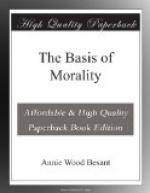This large view of the evolutionary process shows us that it is best studied in two great divisions: the first from the savage to the highly civilised man who is still working primarily for himself and his family, still working for private ends predominantly; and the second, at present but sparsely followed, in which the man, realising the supreme claim of the whole upon its part, seeks the public good predominantly, renounces individual advantages and private gains, and consecrates himself to the service of God and of man. The Hindu calls the first section of evolution the Prav[r.][t.][t.]i M[=a]rga, the Path of Forthgoing; the second the Niv[r.][t.][t.]i M[=a]rga, the Path of Return. In the first, the man evolves by taking; in the second, by giving. In the first, he incurs debts; in the second, he pays them. In the first, he acquires; in the second, he renounces. In the first, he lives for the profit of the smaller self; in the second, for the service of the One Self. In the first, he claims Rights; in the second, he discharges Duties.
Thus Morality is seen from two view-points, and the virtues it comprises fall into two groups. Men are surrounded on every side by objects of desire, and the use of these is to evoke the desire to possess them, to stimulate exertion, to inspire efforts, and thus to make faculty, capacity—strength, intelligence, alertness, judgment, perseverance, patience, fortitude. Those who regard the world as God-emanated and God-guided, must inevitably realise that the relation of man—susceptible to pleasure and pain by contact with his environment—to his environment—filled with pleasure and pain-giving objects—must be intended to provoke in man the desire to possess the pleasure-giving, to avoid the pain-giving. In fact, God’s lures to exertion are pleasures; His warnings are pains and the interplay between man and environment causes evolution. The man who does not believe in God has only to substitute the word “Nature” for “God” and to leave out the idea of design, and the argument remains the same: man’s relation to his environment provokes exertion, and thus evolution. A man on the Path of Forthgoing will, at first, seize everything he desires, careless of others, and will gradually learn, from the attacks of the despoiled, some respect for the rights of others; the lesson will be learnt more quickly by the teaching of more advanced men—[R.][s.]his, Founders of Religions, Sages, and the like—who tell him that if he kills, robs, tramples on others, he will suffer. He does all these things; he suffers; he learns—his post-mortem lives helping him much in the learning. Later on, he lives a more controlled and regulated life, and he may blamelessly enjoy the objects of desire, provided he injure none in the taking. Hin[d.][=u]ism lays down, as the proper pursuits for the household life, the gaining of wealth, the performance of the duties of the position held, the gratification of desire. The desires will become subtler and




